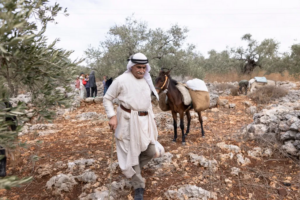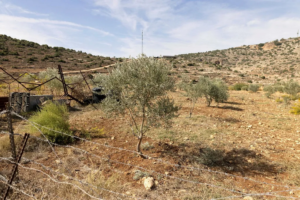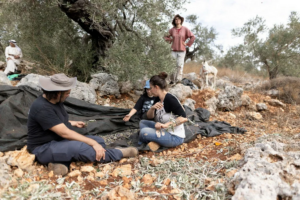West Bank’s Palestinians fear Israeli army and settlers will stop them from harvesting olives again this year

Palestinians harvest olives in Deir Istiya, West Bank, November 2023
Hagar Shezaf reports in Haaretz on 8 October 2024:
The olive harvest season that begins this week in the West Bank is clouded by apprehension. Last year, the harvest was nearly shut down as, due to the war, the army and settlers prevented many Palestinians from accessing their lands, and many worry that similar things will happen this year.
This year, the harvest is of even greater economic importance than usual, because olive trees have a two-year cycle and are due to yield a larger amount of fruit this year, and because more people will need to rely on the olive harvest for their livelihood since Palestinian laborers are still barred from entry into Israel.
The olive harvest season is often a tense time, but the last harvest in the Palestinian village of Dir Istiya in the northern West Bank was particularly difficult. Many of the residents’ olive groves are next to the main road that passes by the village and is used by settlers and Palestinians alike. These plots became a target of a settler campaign to obstruct the harvest, a campaign that sometimes came to involve physical violence. In one incident last November, a settler broke a local man’s teeth and beat up a cab driver.
On several other occasions, the army prevented Palestinians from going to harvest their olives. “Last year, I was accompanying some farmers and soldiers prevented us from going to harvest, and told us that we needed to coordinate it,” says Dir Istiya council chief Firas Diab. Every year, the army decides which Palestinian-owned plots, especially those in close proximity to settlements, require prior coordination with the Civil Administration.
Officially, this policy is meant to protect Palestinians from settler violence and to protect settlers from Palestinians by having a military presence in areas where friction is anticipated. However, this policy is frequently used to limit the harvesting to certain time frames, which often are insufficient for the farmers.
Last year, due to the war, Palestinians were asked to coordinate their arrival with the army at many more plots of land than in the past, and in some places the olive harvest was prevented altogether. The settlers’ behavior can also influence the army’s policy – with an increase in violence on their part leading the army to decide that a certain additional area now requires prior coordination.
“In order to get to 80 percent of our trees, we need to coordinate first with the army,” says Raad Abu Amr, council head of Jalud village, which lies south of Nablus close to the Shiloh settlement and its surrounding outposts. Because of its location, the army and settlers make it very hard for the Palestinians to reach their land.
“There were plots that, before the war, didn’t require prior coordination, but now when we try to get to them the army and settlers immediately come down and chase away the farmers,” Abu Amr says. He also says that some of the plots that were closed off to the Palestinians last year are in Area B, where no coordination is supposed to be required in order to do the olive harvest.

An olive grove in the West Bank village of Deir Istiya in 2023
Abu Amr says he contacted the Civil Administration in order to coordinate the villagers’ work in the olive groves for this season but has yet to receive an answer as of this week. This year, the defense establishment decided that even though the olive harvest season begins right now, access to plots that require coordination will only be permitted after the Jewish holidays due to a shortage of the number of forces that need to be stationed near the olive groves during the harvest and the fear of increased violence.
According to the UN Office for the Coordination of Humanitarian Affairs (OCHA), last year the olive harvest was prevented in more than 96,000 dunams of land in the West Bank because of farmers’ not having access to their lands. According to Food Security Cluster, which is part of the UN’s World Food Programme, the halting of the harvest caused $10 million in losses in the West Bank, and that the damage was largest in the areas of Tul Karm, Qalqilya and Nablus.
An Israeli defense source says that the defense establishment is aware of the economic importance of the olive harvest to the Palestinians, especially this year, because of the worsening economic situation in the West Bank as well as the amount of fruit that is anticipated. He says that because of this, and in light of the difficulties that were seen last year, this year, preparations for the harvest season began earlier in order to ensure that the harvest takes place.
Last year, Yesh Din documented 113 acts of violence by soldiers and settlers to obstruct the harvest, or against Palestinians working on the harvest. The past year also saw an increased presence of settler soldiers in the hagmar (regional defense) battalions, who were often involved in blocking access to lands or in violent actions.
In a letter sent to Avi Blot, head of the IDF Central Command, two weeks ago, Yesh Din called on him to be prepared to protect the olive harvesters, in part by boosting the presence of forces from the Judea and Samaria Police.
Palestinians say that when they tried to coordinate the olive harvest with the army in past years, the dates they were allotted by the army were not always feasible, and when they were given enough time, they often came under attack by settlers while they were harvesting.
“In past year, we tried to coordinate in order to reach our lands, but then settlers came and chased us off,” one woman from Jatt village says. She also says that, since the war started, settlers and the army have blocked the agricultural access roads that lead to some of the village’s olive orchards.
Because of the violence and the lack of access, she gave up on trying to get to her trees and went to join the olive harvest in villages further away from the settlements. “We make an agreement with the elderly owners of olive trees in other villages. We do the harvest for them and then we share the crop,” she says.
Anticipating settler violence, several local council chiefs in the West Bank say they contacted left-wing organizations and Israeli activists ahead of time to come help with the harvest. “Their presence might help a little, although the extremists from Ben-Gvir and Smotrich’s groups don’t distinguish between Jewish peaceniks and Arabs,” Diab says.
There have already been some instances of violence against the olive harvesters in recent days. In one incident, Palestinians who came to harvest olives in the village of Lubn al-Arabi near Ramallah were assaulted by settlers who evidently came from Havat Avichai, among other places, according to a security source. Five Palestinians and three settlers were lightly hurt in the incident.
Several ongoing court proceedings involve criticism of the policy that has been restricting Palestinians’ access to agricultural lands since the beginning of the war, and not just during the olive harvest season. The first is a petition submitted in December by attorney Qamar Mashriqi-Assad on behalf of the Haqel human rights group, claiming that soldiers are preventing Palestinians from accessing their farmland in the Hebron Hills region and also confiscating farming equipment from them.

Olive harvest in the West Bank village of Deir Istiya, November 2023
In March, the High Court of Justice ordered the state to explain why access to these lands was being blocked and what the state is doing about it. In response, the state submitted to the court a “page of instructions for the commander” that clearly says that Palestinians are to be allowed access to their lands and that soldiers who witness infractions of the law by an Israeli civilian must detain the suspect and report the incident to the police. The page stresses that “a soldier is not permitted to stand by and do nothing.”
Another court case has to do with Palestinians’ access to farmland in the “seam zone” – an area over the Green Line in the West Bank that Israel added to its territory with the construction of the separation fence. The land here is on the Israeli side of the fence but privately owned by Palestinians, and therefore Israel is obligated to allow them access to it. But Israel only allows access to Palestinians who have obtained a specific permit for this, and the land is reached through gates that are only opened for limited hours, even in normal times.
Hamoked – The Center for the Defense of the Individual says that since the start of the war, the state has blocked nearly all access to lands on the Israeli side of the fence, and has only allowed a small number of farmers who work these plots every day to access them. The state recently sent the court an update indicating it plans to increase the number of gates that will be opened during the harvest season, but will only do so after the Jewish holidays.
Hamoked informed the court that Nasser Maflah, the chief Palestinian liaison in Tul Karm, reports that the Civil Administration asked him to present a very small list of farmers who could pass through the gates during the olive harvest – of just five to 10 farmers per gate, a much lower number than would transit through these gates in regular olive harvest seasons.
The IDF and Civil Administration say: “For several months, the defense establishment has been preparing to enable the Palestinians to harvest olives on their lands. All subject to an assessment of the situation and while guarding the security of the harvesters in the area… In addition to the operational preparations, the Civil Administration is in continuous contact with Palestinian officials in order to optimize the work and coordinate times for the olive harvest.”
This article is reproduced in its entirety
